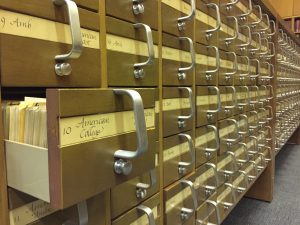Yesterday I described how a sixteen-year-old letter from
George Washington was published in 1792, showing the public some less than flattering comments on
Artemas Ward, his predecessor as head of the American army outside Boston.
At the time, both Washington and Ward were holding federal office in Philadelphia, the first as President and the second as a Representative from Massachusetts.
Awkward.
How did Ward react to that revelation? I think we can be sure that he confronted Washington about the letter because multiple people in the nineteenth century described him doing so. But we can’t be sure of
how that confrontation really went because none of those descriptions was first-hand. The two men probably had a frosty exchange of words, of the sort that might have sent younger men to the dueling field, but they were discreet enough to keep their disagreement to themselves.
Here are the three surviving versions of what happened. The first came from a letter that
Christopher Gore, then a former governor of Massachusetts, wrote to Ward’s son on 22 Jan 1819:
In conversation with our late Friend Samuel Dexter, and not many months before his Death, He mentioned to me, that your Father, who was a Representative in Congress, at the same time with himself, invariably attended President Washington’s Levees, in Philadelphia, and as invariably declined the President’s Invitation to Dinner, which He occasionally received during the Sessions.
This conduct, on the part of General Ward, was owing, as He Mr Dexter conceived, to a Letter published in the early part of the revolutionary war, which contained Remarks, injurious to the Reputation of General Ward, and purported to have been written by General Washington. On the subject of this Letter perfect Silence was observed by General Washington, until He had retired from public Life, and he had declined any further Election to the Supreme Magistracy of the Union.
He then wrote to General Ward, declaring to Him, in the most explicit Language, that He did not write the Letter, nor ever knew of it until its Publication in the Newspapers. He apologized, at the same time, for not having done this act before, which He considered equally due to General Ward & to Himself, from a Resolution that He judged prudent to adopt at the Commencement of the War, in Respect to every Publication that sought to embroil Him with the Officers civil or military of the U. States.
This Letter at the same Time expressed, in unequivocal Terms, the highest Regard for the character & Conduct of General Ward, in all the Departments of public Duty, in which He had acted. Genl. Washington further stated, that, although He had refrained from having written, or spoken on this Subject, He had always Kept among his Papers a Certificate of like Purport with the Communication then made, to be used in case of his Death, before the Circumstances of his Life prevented his doing what He had then done.
Having inferred from some Conversation with you, that this Fact was unknown, I have taken the Liberty to relate it precisely, according to my Recollection, as I had it from Mr Dexter.
No such letter or certificate survives in either the Ward papers or the Washington papers.
The second comes from the
Reminiscences of the Reverend George Allen, published soon after his death in 1883:
Ward was a man of incorruptible integrity. Of his bravery there is no question, although Washington accused him of cowardice in leaving the service before Boston. Benjamin Stone, the first preceptor of Leicester Academy [and a correspondent of Ward who died in 1832], gave me the following account of Ward’s misunderstanding with Washington. Soon after the establishment of the Government at New York, Ward, then a member of Congress, came into possession of a letter written by Washington, in which the offensive charge was made. He immediately proceeded to the President’s house, placed the paper before him, and asked him if he was the author of it. Washington looked at the letter and made no reply. Ward said, “I should think that the man who was base enough to write that, would be base enough to deny it,” and abruptly took his leave.
And the third is from the not-always-reliable local historian Samuel A. Drake in
Historic Fields and Mansions of Middlesex (1874):
It is well known that Washington spoke of the resignation of General Ward, after the evacuation of Boston, in a manner , approaching contempt. His observations, then confidentially made, about some of the other generals, were not calculated to flatter their amour propre or that of their descendants. It is said that General Ward, learning long afterwards the remark that had been applied to him, accompanied by a friend, waited on his old chief at New York, and asked him if it was true that he had used such language. The President replied that he did not know, but that he kept copies of all his letters, and would take an early opportunity of examining them. Accordingly, at the next session of Congress (of which General Ward was a member), he again called with his friend, and was informed by the President that he had really written as alleged. Ward then said, “Sir, you are no gentleman” and turning on his heel quitted the room.
Drake offered no source for who told this story.
If I had to guess, I’d say Ward did confront Washington privately, one senior gentleman to another, and told him what he wrote in 1776 was rude and hurtful. Washington, knowing that was correct, did not argue. Whether he later wrote a letter or certificate attesting to Ward’s good qualities but never sent it seems less likely; Washington preferred to let things lie.
The two men remained distant colleagues. Ward, despite being older and suffering from paralytic strokes, outlived Washington by ten months.







